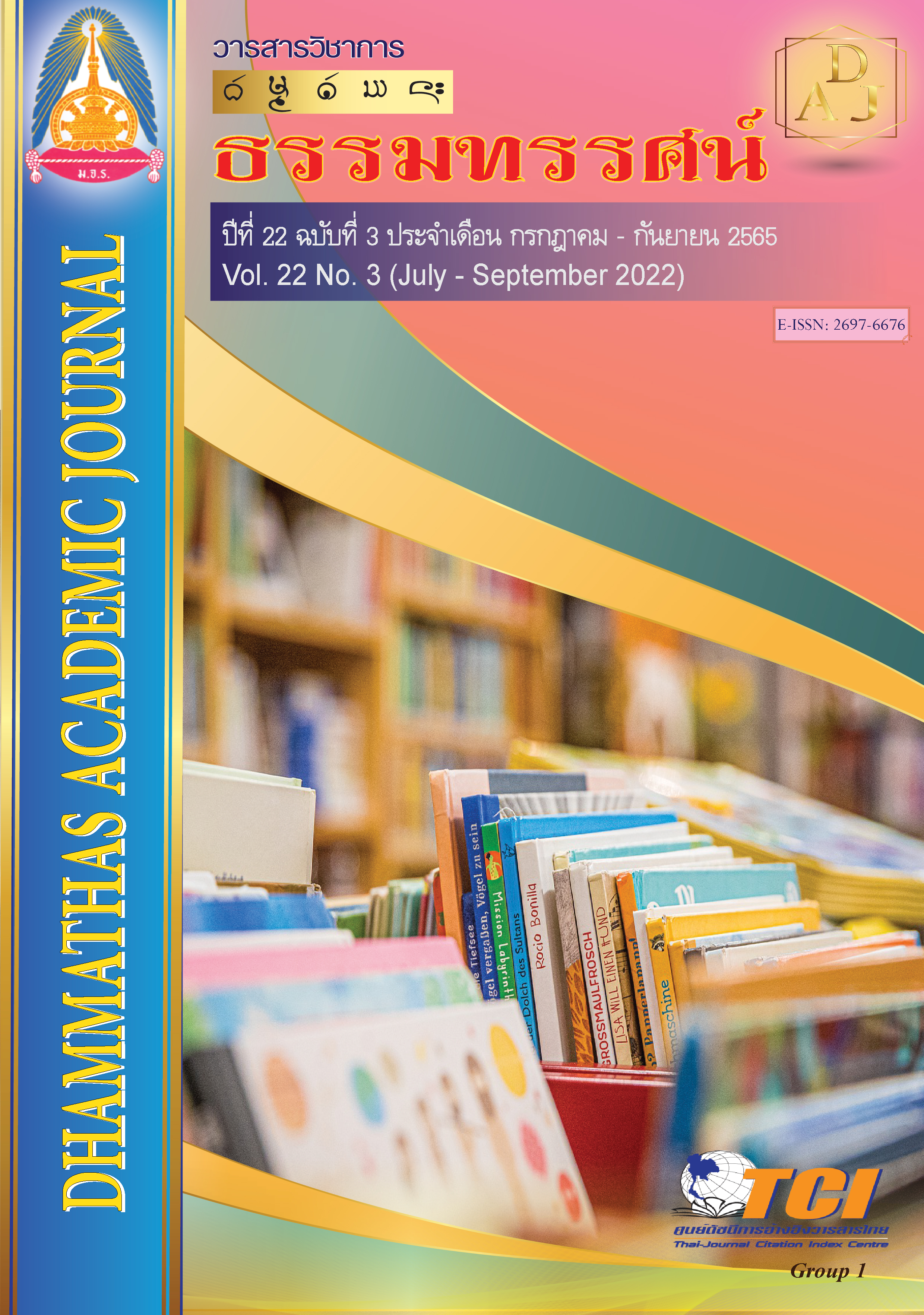The Role of Monks in Environmental Management of the Community in Khon Kaen City
Main Article Content
Abstract
The purpose of this research is to study the role of monks in environmental management of the community in Khon Kaen city. By using a qualitative approach to collect the important data from 13 respondents, this study conducts an in-depth interview and with and without participatory observation.
The results reveal that: monks play a key role in being a leader to set up a system and policy about the community environmental management. Particularly, monks are the ones who take the problem seriously and lead the villagers to act earnestly, and this widely spreads to the communityat the household level. The role of educating the environment through the Buddhist principles to enhance knowledge and understanding of the villagers towards the problem and treat it at their own house, the community environmental management needs to promote and encourage monks and villagers to work and develop a space together. Specifically, the central space should be open for temples, villages, monks, and villagers to exchange, talk, and discuss frankly, and find a solution to address an environmental problem together.
Article Details

This work is licensed under a Creative Commons Attribution-NonCommercial-NoDerivatives 4.0 International License.
เพื่อให้เป็นไปตามกฎหมายลิขสิทธิ์ ผู้นิพนธ์ทุกท่านต้องลงลายมือชื่อในแบบฟอร์มใบมอบลิขสิทธิ์บทความ ให้แก่วารสารฯ พร้อมกับบทความต้นฉบับที่ได้แก้ไขครั้งสุดท้าย นอกจากนี้ ผู้นิพนธ์ทุกท่านต้องยืนยันว่าบทความ ต้นฉบับที่ส่งมาตีพิมพ์นั้น ได้ส่งมาตีพิมพ์เฉพาะในวารสาร วิชาการธรรม ทรรศน์ เพียงแห่งเดียวเท่านั้น หากมีการใช้ ภาพหรือตารางของผู้นิพนธ์อื่นที่ปรากฏในสิ่งตีพิมพ์อื่นมาแล้ว ผู้นิพนธ์ต้องขออนุญาตเจ้าของลิขสิทธิ์ก่อน พร้อมทั้ง แสดงหนังสือที่ได้รับการยินยอมต่อบรรณาธิการ ก่อนที่บทความจะได้รับการตีพิมพ์References
เจษฎา มูลยาพอ. (2556). การประยุกต์ใช้หลักคำสอนด้านนิเวศวิทยาในพระไตรปิฎกเพื่อการอนุรักษ์สิ่งแวดล้อมของพระสงฆ์ในจังหวัดอุดรธานี. (รายงานการ
วิจัย). หนองคาย: มหาวิทยาลัยมหาจุฬาลงกรณราชวิทยาลัย วิทยาเขตหนองคาย.
พระครูสังฆรักษ์ประจวบ วุฑฺฒิจารี และ วีรธรรม ปัญจขันธ์. (2562). บทบาทของพระสงฆ์ในการพัฒนาสังคม จังหวัดเชียงใหม่. วารสารพุทธศาสตร์ศึกษา, 10(1), 101-119.
พุทธรักษ์ ปราบนอก. (2562). ปัญหาภาวะโลกร้อนของวัดในพุทธศาสนา. มนุษยศาสตร์และสังคมศาสตร์, 36(2), 163-175.
พุทธรักษ์ ปราบนอก และคณะ. (2563). ตัวแบบการจัดการสิ่งแวดล้อมของวัดในภาคอีสาน. มนุษยศาสตร์และสังคมศาสตร์, 37(3), 132-161.
Crutzen, P. J. (2006). The “Anthropocene”. In Ehlers, E., Krafft, T (Ed.). Earth system science in the anthropocene (pp. 13-18). Berlin: Springer.
Daniels, P. L. (2010). Climate change, economics and Buddhism—Part 2: New views and practices for sustainable world economies. Ecological Economics, 69(5), 962-972.
_______. (2011). Buddhism and sustainable consumption. In Zsolnai, L. (Ed.). Ethical Principles and Economic Transformation-A Buddhist Approach (pp. 35-60). Dordrecht: Springer.
Glassman, J. & Sneddon, C. (2003). Chiang Mai and Khon Kaen as growth poles: regional industrial development in Thailand and its implications for urban sustainability. The Annals of the American Academy of Political and Social Science, 590(1), 93-115.
Hagan, F. E. (2006). Research Methods in Criminal Justice and Criminology. (7th ed.). Boston, MA: Allyn and Bacon.
Henning, D. H. (1998). Buddhism and Deep Ecology: protection of spiritual and cultural values for natural tropical forests in Asia. In Personal, societal, and ecological values of wilderness: Proceedings of the Sixth World Wilderness Congress (pp. 108-112). United States: Department of Agriculture Forest Service.
Roof, K. & Oleru, N. (2008). Public health: Seattle and King County’s push for the built environment. Journal of environmental health, 71(1), 24-27.
Setchell, C. A. (1995). The growing environmental crisis in the world's mega cities: the case of Bangkok. Third World Planning Review, 17(1), 1-18.
Sudhipongpracha, T. & Dahiya, B. (2019). City Profile: Khon Kaen, Thailand. Environment and Urbanization ASIA, 10(2), 271-289.
Thongyou, M., Chamaratana, T., Phongsiri, M., & Sosamphanh, B. (2014). Perceptions on urbanization impact on the hinterlands: A study of Khon Kaen city, Thailand. Asian Social Science, 10(11), 33-41.
UNDP. (1991). Cities, People and Powny; Urban Dewlopment Cooperation for tile 1990s. New York: UNDP.
Weick, K. E. (1995). Sensemaking in Organizations. Thousand Oaks, CA: Sage.

